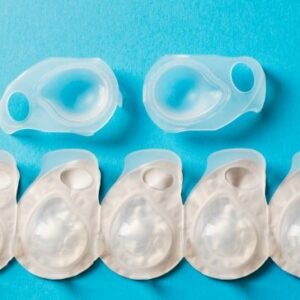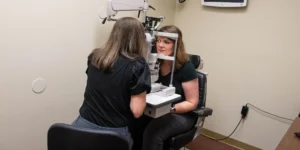If you tune in to the Today Show at all, you know that co-anchor Savannah Guthrie has been absent from the show due to a serious eye injury. Guthrie, 47, first shared the news of her injury in late November, explaining that she was undergoing laser treatments to repair a torn retina caused when her young son accidentally threw a toy train that hit her right eye. 
Within 24-hours after the sharp, pointed edge of the toy hit her eye, Guthrie lost vision in that eye due to a build-up of blood behind the retinal tear. She underwent nearly daily laser treatments in an attempt to repair the torn retina, but ultimately surgery was required to repair and reattach her retina.
Torn retinas like Guthrie’s do carry a high risk of retinal detachment. Detachment occurs when the thin layer of retinal tissue pulls completely away from the eye, which can lead to permanent blindness. In these cases, the longer treatment is delayed, the higher the risk is of permanent blindness in that eye.
Tips From A Local Eye Doctor
So how common are serious eye injuries? And what should you do if your eye is hit, scratched, cut, or even splashed by chemicals?
Dr. Thompson, the optometrist at Hardin Valley Eyecare & Optical, says, “I see retinal tears or detachment a few times each year. Patients typically will experience flashes of light, a sudden onset of floaters or little black spots, and may feel like part of their vision is missing. If anyone sees flashes that persist or a sudden onset of floaters, they need to be seen that day to make sure they don’t have a tear or detachment which would require surgery quickly.”
He notes that people who are nearsighted—meaning they have trouble seeing in the distance—are more at risk for these types of eye injuries, especially if their prescription is high (above a -4.00).
Aside from injuries to the retina, Dr. Thompson says, “The most common eye injuries I see are corneal abrasions, which is when someone scratches their cornea. The most common causes are fingernails, tree limbs, dogs paws, etc.”
He adds, “I also see a lot of foreign bodies in eyes, such as metal or something embedded in someone’s cornea. With both scratches and something embedded in the eye, patients will have pain, redness, and sensitivity to light. I’ve also noticed an increase in people getting hit in the eye with nerf guns.”
Symptoms Of Serious Eye Injuries
The most common symptoms of serious retinal or corneal injuries that require immediate medical care include:
- The onset of blurry vision or lost vision
- Seeing floaters or black specks
- Sudden onset of seeing flashes of light
- Pain in the eye
- Redness, or blood in the clear part of the eye
- Sensitivity to light
- An unusual pupil size or shape
- A sensation that there’s something in the eye or under the eyelid that tears and blinking can’t remove
While these symptoms indicate you need quick medical attention, you should also know that you can’t always tell when an eye is serious. Sometimes a detached retina can only be seen during an eye doctor’s examination. Some injuries can also cause slow bleeding or raise eye pressure, which are problems that only become obvious when they get really serious.
Untreated eye injuries can cause vision loss or blindness, so it’s important to know what to do and when to seek help when eye injuries occur—even if the injury seems minor at first. Here are guidelines about what you should and shouldn’t do for the most common eye injuries:
Hits Or Blows To The Eye
- DO apply a cold compress, gently, to reduce pain and swelling.
- DO NOT apply any pressure.
- DO NOT apply steaks or other food items as these can get bacteria in your eye.
- If you experience any of the symptoms listed above—even after a light blow—immediately contact your eye doctor or emergency room.
Cuts or Punctures
- DO NOT attempt to remove any objects that are stuck in the eye.
- DO gently place a protective cover over the eye. Tape heavy paper, such as the bottom of a paper cup, to your browbone and cheekbone to shield the eye until you get medical attention.
- DO NOT apply pressure or press the shield against the eye.
- DO NOT rinse with water.
- DO NOT rub your eye.
- DO NOT take aspirin or ibuprofen, as these medications can thin the blood and may increase bleeding.
Chemical Burns Or Splashes
- DO flush your eye immediately with clean water for several minutes.
- If you have the container the chemical came in, look at the label for warnings about eye damage to see if there are specific instructions regarding that type of chemical.
- DO seek medical treatment right away with your eye doctor or the emergency room.
Dr. Thompson cautions that safety glasses are important to protect your eyes if you know you’ll be doing something that puts you at risk, such as working with wood, metal, or playing sports. If you do experience an eye injury, call our office right away and we’ll take care of you.
Since 2009, Harden Valley Eyecare & Optical has provided the highest quality vision care products and trusted optometry services to our patients in Knoxville and the surrounding areas. Our eye care professionals are dedicated to providing exceptional personal service to each and every person who walks through our door. Stop by our practice at 10904 Spring Bluff Way off Hardin Valley Road, call us at (865) 409-1253, or contact us to schedule your appointment.





